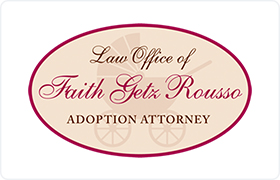Oakdale Adoption Lawyer, New York
Sponsored Law Firm
-
 x
x

Click For More Info:
-
Law Office of Faith Getz Rousso, P.C.
591 Stewart Avenue, Suite 591, Garden City, NY 11530» view mapAdoption Experienced Adoption Lawyer
The goal of Law Office of Faith Getz Rousso, P.C. is to hold our client's hand and guide them through the process until there is a child in their arms.
516-500-9292
Jennifer A. Mendelsohn
Farms, Divorce, Child Support, Adoption
Status: In Good Standing Licensed: 33 Years
David Mitchell Ardam
Traffic, Estate, Adoption, Accident & Injury
Status: In Good Standing Licensed: 46 Years
Elizabeth Jodi Grosso
Prenuptial Agreements, Family Law, Divorce, Child Custody, Adoption
Status: In Good Standing Licensed: 20 Years
 Faith Rousso Garden City, NY
Faith Rousso Garden City, NY AboutLaw Office of Faith Getz Rousso, P.C.
AboutLaw Office of Faith Getz Rousso, P.C. Practice AreasSpecializations
Practice AreasSpecializations
